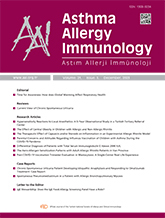


Objective: Local anesthetics are broadly used in various health care settings with high probability of lifetime exposure. The main aim of this study was to determine the characteristics and risk factors of the patients presenting to our allergy outpatient clinic due to suspected hypersensitivity to local anesthetics.
Materials and Methods: We retrospectively evaluated the clinical data and test results obtained from patients who had presented to our allergy outpatient clinic for allergological work-up of local anesthetics from 2015 to 2020.
Results: A total of 289 subjects were included. The most common referral reason was a history of non-local anesthetic drug hypersensitivity reaction (65.7%, n=190). Twenty-five out of 289 (8.65%) patients had positivity for at least one of the tested drugs in skin prick test/ intradermal test/ subcutaneous drug provocation test. Of these 25 patients, 4 (16%) had a history of DHR to LA and 9 (36%) had a history of multiple drug hypersensitivity (MDH). Allergy to local anesthetics was observed in only 13 (18.6%) of 70 patients with a history of local anesthetic hypersensitivity reaction. Patients with atopy were 5.3 times more likely to have local anesthetic hypersensitivity (odds ratio: 5.254; 95% CI: 1.316-20.974; p=0.019). Cross-reactivity among amide-local anesthetics without a distinct predictive pattern has also been demonstrated in 3 patients.
Conclusion: Most patients who report local anesthetic allergy can tolerate local anesthetics without having a hypersensitivity reaction. Atopic status is associated with increased risk of a hypersensitivity reaction to local anesthetics. Atopic patients are candidates for performing allergy tests to local anesthetics to enable appropriate counseling.